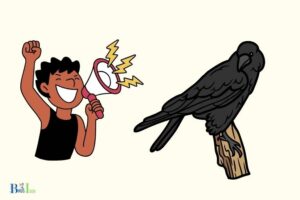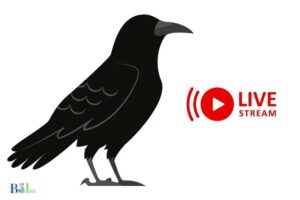What Is The IQ Of A Crow? Discover!
Crows are known for their impressive cognitive abilities, but assigning an IQ score to a crow is not straightforward, as IQ tests are designed for humans.
However, studies suggest that crows possess intelligence comparable to that of great apes in certain aspects, such as problem-solving and tool use.
Crows exhibit a range of intelligent behaviors that indicate high cognitive function:
Despite the lack of a specific IQ score, crows are widely recognized as one of the smartest bird species, with their intelligence playing a crucial role in their ability to adapt and thrive in various environments.

Key Takeaway
The Brainpower of Crows
The cognitive abilities of crows have been the subject of extensive scientific research, revealing their remarkable problem-solving skills and advanced tool use.
Studies have shown that crows possess a high level of intelligence, comparable to that of some primates.
They are capable of using tools to obtain food, such as bending a piece of wire to create a hook for extracting insects from crevices.
Additionally, crows have demonstrated the ability to solve complex puzzles and even use vehicles to crack open nuts by placing them in the path of cars to be run over and cracked open.
These findings suggest that crows possess a sophisticated level of cognitive functioning, challenging traditional notions of avian intelligence and highlighting the need for further exploration of their remarkable brainpower.
Measuring Crow Intelligence
Measuring crow intelligence involves assessing various cognitive abilities, problem-solving skills, and social behaviors.
Understanding the extent of crow problem-solving skills, tool usage, and social intelligence provides insight into their overall cognitive capacity.
Crow Problem-Solving Skills
Crow problem-solving skills have been studied extensively in order to assess their intelligence.
Researchers have conducted numerous experiments to understand the cognitive abilities of crows.
Some of the key findings include:
- Crows have demonstrated the ability to use tools, such as sticks, to extract food from hard-to-reach places.
- They exhibit advanced problem-solving skills by using trial and error to achieve their goals.
- Crows have displayed remarkable social intelligence, cooperating with each other to accomplish complex tasks.
These observations suggest that crows possess a high level of intelligence and adaptive reasoning, allowing them to thrive in various environments.
Understanding the problem-solving abilities of crows provides valuable insights into their cognitive processes and evolutionary development.
Crow Tool Usage
Researchers have employed various methods to gauge the intelligence of crows, with a particular focus on their adeptness in using tools.
Crows are known for their remarkable tool usage, which is considered a strong indicator of their problem-solving abilities and intelligence.
In numerous studies, crows have been observed using tools in various contexts, such as foraging for food, extracting insects from crevices, and even crafting and modifying tools for specific tasks.
Their ability to select, shape, and utilize tools demonstrates a high level of cognitive flexibility and innovation.
Additionally, experiments have shown that crows can solve complex problems by using tools, further highlighting their advanced cognitive skills.
The extensive research on crow tool usage provides valuable insights into the intelligence and adaptability of these avian species.
Crow Social Intelligence
The extensive research on crow tool usage provides valuable insights into their social intelligence and overall cognitive abilities.
Crows exhibit remarkable social intelligence, as evidenced by their ability to solve complex problems, share information within their social groups, and even engage in cooperative hunting.
Crows have been observed using tools in innovative ways, such as shaping twigs to extract insects from crevices, showcasing their adaptive and inventive nature.
Their ability to communicate and share information within their social groups demonstrates a high level of social intelligence, fostering cooperation and collective problem-solving.
The cooperative hunting behavior of crows highlights their advanced social cognition, as they work together to achieve shared goals, displaying a sophisticated level of coordination and collaboration.
This social intelligence contributes to their overall cognitive prowess, impacting their problem-solving abilities and adaptive behaviors.
Understanding the social aspects of crow intelligence provides valuable insights into their cognitive capacities.
Transitioning into the subsequent section about ‘factors affecting crow IQ’, it is crucial to consider the environmental and genetic influences that shape the cognitive abilities of these intelligent birds.
Factors Affecting Crow IQ
Several environmental and genetic factors influence the IQ of crows. These factors can play a significant role in determining the cognitive abilities of these birds.
The table below outlines some key factors affecting crow IQ:
| Environmental Factors | Genetic Factors |
|---|---|
| Access to food sources | Genetic predisposition |
| Exposure to enrichment | Inherited learning abilities |
| Social interactions | Genetic diversity |
| Predation pressure | Inherited problem-solving skills |
| Habitat complexity | Genetic adaptation to environment |
Understanding how these factors affect crow intelligence is crucial in further exploring their cognitive abilities and behavior.
By considering both environmental and genetic influences, we can gain valuable insights into the remarkable intelligence of crows.
Moving forward, it is essential to compare crow intelligence with other species to gain a comprehensive understanding of their cognitive abilities.
The Evolution of Crow Cognition
Over the past few decades, research has revealed a remarkable evolution of cognitive abilities in crows.
These highly intelligent birds have demonstrated complex problem-solving skills, advanced communication abilities, and tool usage.
The following table illustrates the evolution of crow cognition in comparison to other intelligent animals:
| Cognitive Ability | Crows | Other Intelligent Animals |
|---|---|---|
| Problem-solving | Advanced | Varied |
| Communication | Intricate | Diverse |
| Tool Usage | Demonstrated | Limited |
Crows have shown an extraordinary capacity to adapt and thrive in diverse environments, indicating a significant evolutionary leap in their cognitive processes.
This remarkable evolution raises intriguing questions about the factors that have contributed to the development of such advanced cognitive abilities in crows compared to other intelligent animals.
This leads us to explore the implications of crow IQ research.
Implications of Crow IQ Research
Research on the IQ of crows has significant implications for understanding the cognitive abilities of these intelligent birds, particularly in comparison to other species.
The findings of crow IQ research can evoke a sense of wonder and appreciation for the complexity of the natural world, highlighting the remarkable intelligence of these birds.
Additionally, it may lead to a greater respect for the capabilities of all species, challenging human-centric views of intelligence and cognition.
Furthermore, understanding the cognitive abilities of crows can inspire a desire to protect and conserve their habitats, recognizing the importance of preserving environments that support such remarkable cognitive development.
Ultimately, crow IQ research has the potential to foster a deeper connection to the natural world and a greater appreciation for the diverse forms of intelligence that exist within it.
Conclusion
The study of crow intelligence has revealed impressive cognitive abilities, including problem-solving, tool use, and social learning.
These findings have important implications for understanding the evolution of intelligence in animals and the potential for complex cognition in non-human species.
As we continue to unravel the mysteries of crow IQ, we gain greater insight into the remarkable capabilities of these birds and the intricate workings of the avian mind.






